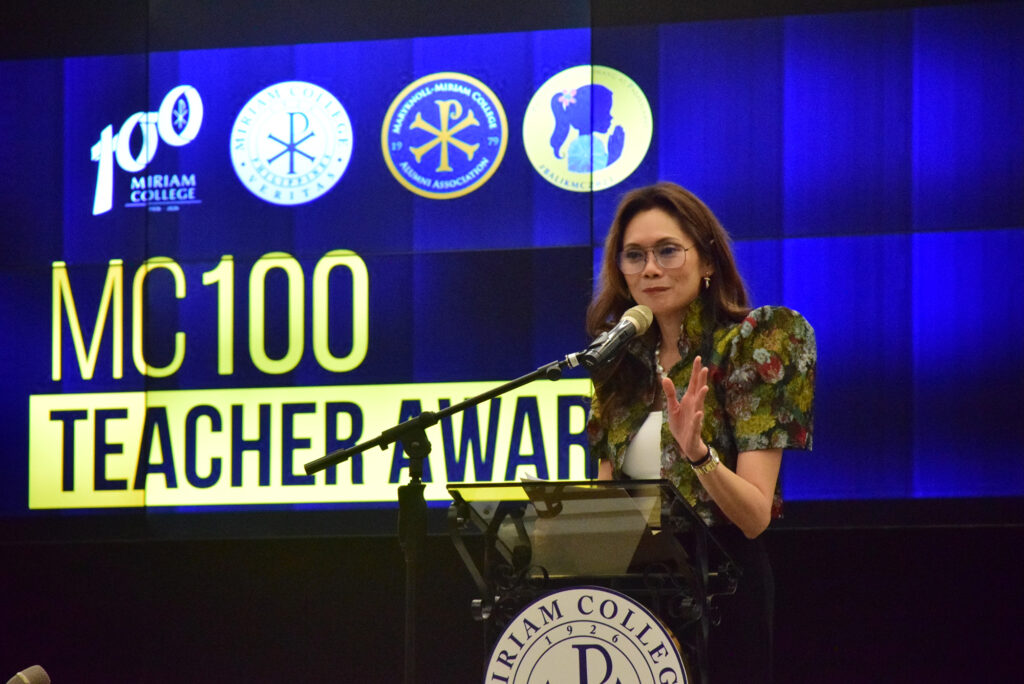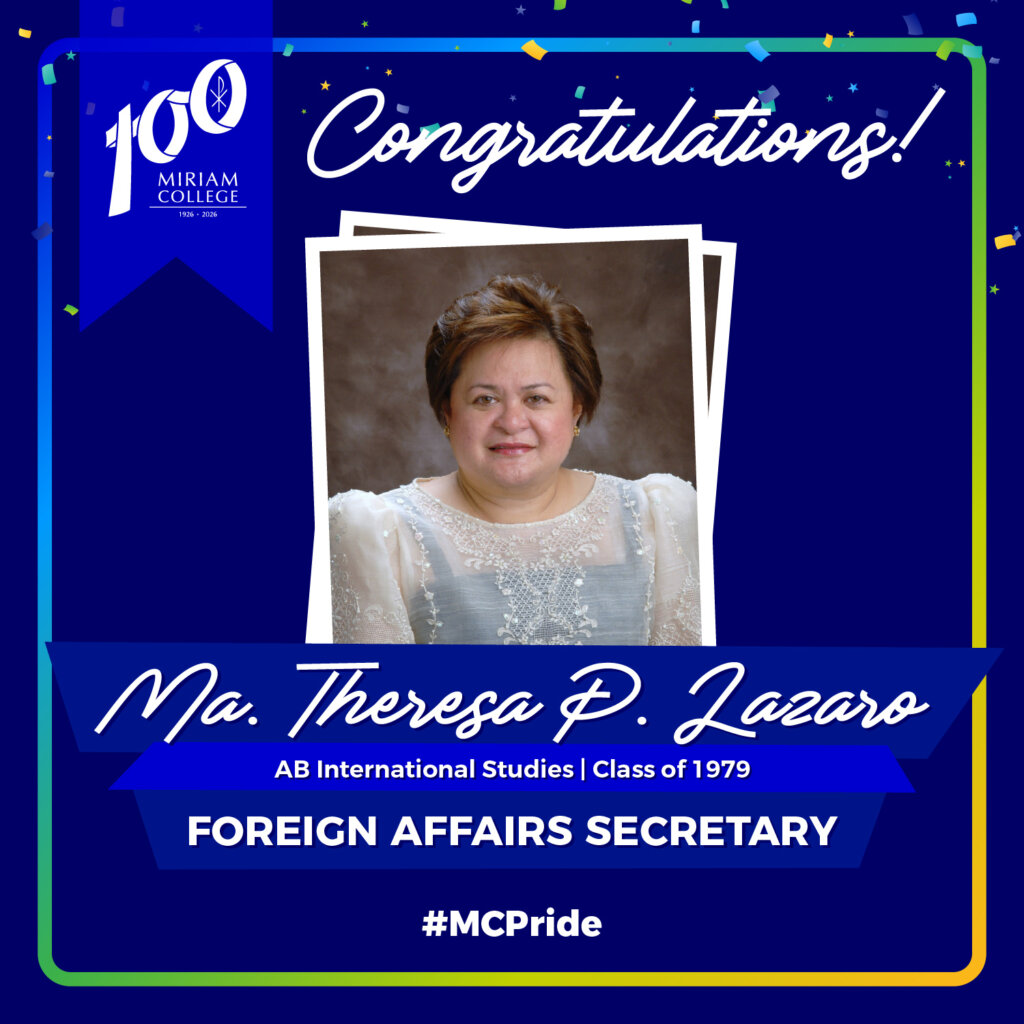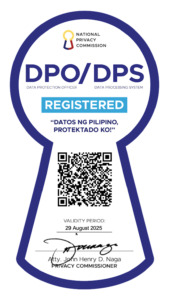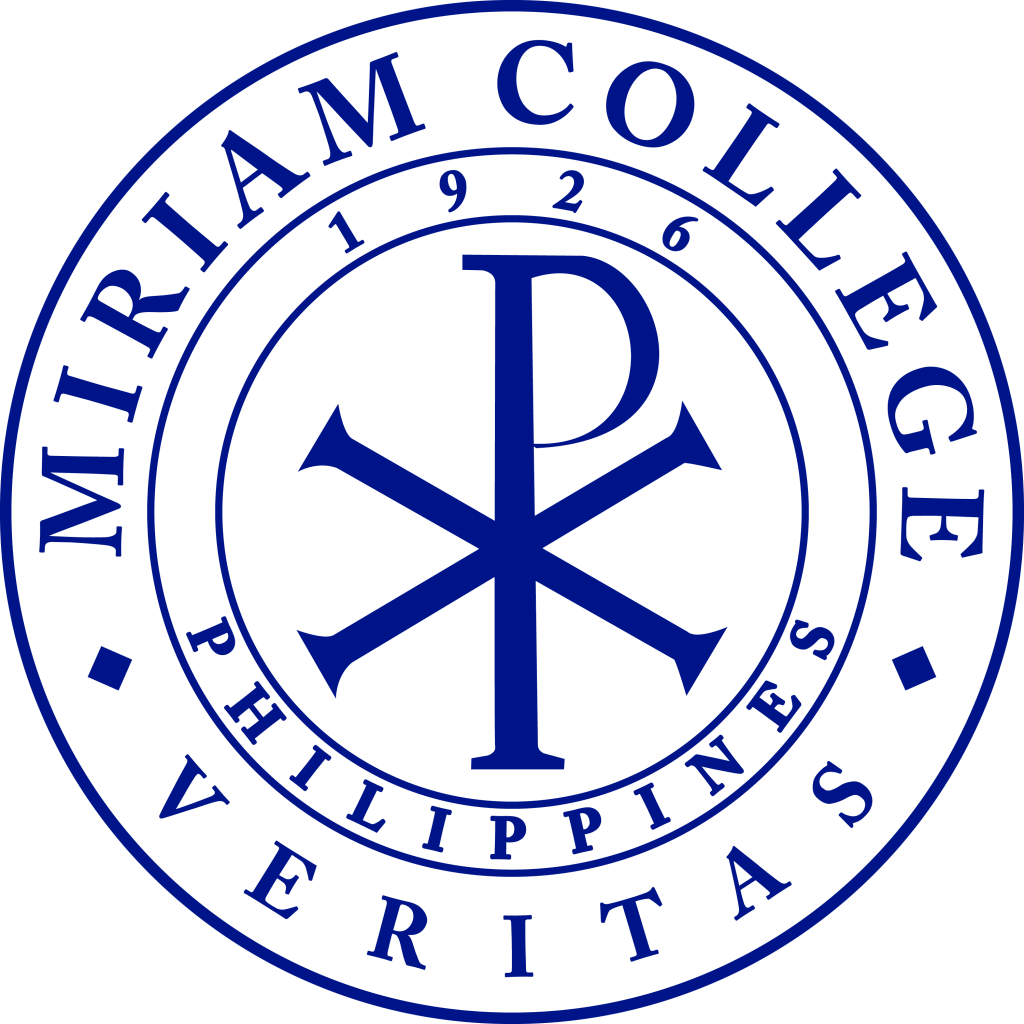Miriam College President, Ambassador Laura Quiambao-del Rosario, members of the MCAA Board of Directors, Convenor of the MC 100 Teacher Awards, Dr Gail Reyes Galang, fellow educators, friends, good afternoon. It is an honor and a pleasure to be here with all of you. Thank you so very much for the invitation.
I was a Maryknoll student from preschool to high school, or for 13 very formative and foundational years of my life. Here, our teachers nurtured not only our intellectual growth, but also our psychosocial development. Through their guidance, I learned to adeptly interact with others, build constructive relationships, uphold ethical standards, and engage in acts of service. My identity has been shaped in large part by Maryknoll, and I stand here filled with immense gratitude to our school.
Our Maryknoll teachers established very high standards and consistently pushed us to surpass our own perceived limits. I can still envision Ms. Fernando, our formidable Filipino high school teacher, who ensured that we developed a deep appreciation for our national language and could confidently express ourselves in it. My very first “move exam” was given by our enthusiastic Grade 4 Math teacher, Ms. Mauricio. She presented challenging multiplication questions placed on various desks, and we would swiftly move from one desk to another, solving them within strict time constraints that concluded with her ringing a bell.
Mrs. Gajete, our imposing high school Trigonometry teacher, delivered her lessons so brilliantly that Math 11 and 14 at UP became a breeze for me. Lastly, in our senior year of high school, our English teacher entrusted another student and me with the responsibility of leading multiple sessions dedicated to discussing the coming-of-age novels “Catcher In the Rye” by J. D. Salinger and “A Separate Peace” by John Knowles. You could say this experience marked my initial foray into the realm of teaching. While I have numerous other cherished memories, time constraints compel me to conclude my reminiscences here.
I currently hold the position of Professor at the Department of Women and Development Studies, University of the Philippines Diliman, and I have been teaching full-time for the past 16 years. Additionally, I serve as a dissertation adviser to doctoral students pursuing their Doctor of Social Development degrees in our College, including Dr Mel Reyes, one of my former advisees. I have been tasked with sharing my insights into the top three characteristics of an effective educator. While my teaching focuses on the graduate level, these qualities are universally applicable to teachers at all levels. Furthermore, I have been asked to delve into how these particular characteristics can impact students as they embark on their journey to champion an advocacy in the future. Thus, my selection of the three traits is inherently linked to this purpose, recognizing that there exists a multitude of attributes that define effective teachers. The characteristics I will enumerate are also very much aligned with Miriam College’s vision and mission.
I will employ the framework of “transformative scholarship,” which we embrace at the UP College of Social Work and Community Development. Transformative scholarship acknowledges the academe’s responsibility in championing social justice and instigating essential structural transformations. It is dedicated to addressing real-world issues and, as a result, endeavors to harmonize our teaching, research, and public service mandates with this overarching mission.
Effective teaching goes beyond the mere conveyance of information; it encompasses the capacity to empower students, fostering in them the qualities of lifelong learning, critical thinking, and social engagement. This constitutes the primary characteristic of an effective teacher, and I will provide a concise elaboration of all three attributes that we should be promoting in our students.
Lifelong learning is a both a mindset and a practice that extend beyond formal education. It involves being curious, constantly asking questions and seeking answers to them, and exploring new ideas and concepts. It entails being open to different perspectives and being willing to challenge our own beliefs and assumptions. It is about being unafraid of what is unfamiliar, or of change.
Critical thinking involves the mental disposition and skills to analyze and evaluate diverse types of knowledge, information, and situations. It prompts students to continually consider issues both reflectively and discerningly.
Being socially engaged is about participating in and addressing social or community concerns. It implies a commitment to taking an active role in shaping the direction of our society, making a positive impact, and promoting transformative social change.
All three – being a lifelong learner, critical, and socially-engaged – are interconnected, complementary, and synergistic attributes. Continuous learning informs critical thinking, and both are applied to purposeful social engagement. Together, they promote a cycle of personal growth, active citizenship, and a sense of responsibility over the collective well-being and future of our nation and the world.
The second characteristic of an effective teacher is being compassionate, or feeling sympathy, empathy, and concern for those who suffer; showing kindness, understanding, generosity, and a willingness to alleviate their suffering. Compassion is about being concerned for the well-being of others, and ensuring that everyone is included and treated fairly. It is founded on respecting and embracing the full diversity of individuals, acknowledging that we all have intersecting identities that result in different experiences and needs, and recognizing each person’s inherent worth and dignity. By embodying compassion, we inspire our students to cultivate this attribute within themselves.
The third characteristic of an effective teacher involves engaging in activism. Activism encompasses a wide range of actions that promote societal transformations. As educators, our responsibilities extend beyond teaching; we should also be activists who merge the attributes of a devoted instructor with a dedication to advancing social justice. Beyond our classroom duties, it is imperative that we participate in community mobilization, advocate for causes, volunteer, and partake in campaigns aimed at consciousness-raising, questioning established but harmful norms, and exerting influence on decision-makers to foster justice and equality within policies, legislation, and practices.
It is widely acknowledged that, in our capacity as educators, we wield a significant impact on the trajectories of our students’ lives. We are instrumental in cultivating the next generation of enlightened, empowered, and engaged individuals who possess the impetus to effect positive change. Moreover, we serve as catalysts, motivating them to discover causes that resonate deeply with them, and to dedicate themselves wholeheartedly to these advocacies.
The emphasis on lifelong learning and critical thinking equips students with the skills they need to investigate and understand complex issues. These are invaluable when students start exploring potential advocacies and practicing social engagement.
Compassion demonstrated by teachers plants the seeds of empathy, social awareness, and the desire to make a difference. It is compassion that impels activism because it connects individuals with the humanity of the many systemic inequalities that marginalized sectors face. It can influence students to identify and champion advocacies that align with their values and passions, and motivate them to be more courageous and tenacious. It is activism driven by compassion that is more likely to resonate with others because it is not only minds we have to change, but also hearts.
Lastly, when students see their teacher’s activism, and their passion and commitment to social justice, it serves as a powerful model and ignites them to envision their own roles in contributing to social development. It demonstrates that caring about and zealously working toward societal transformation is not only a moral imperative, but also profoundly meaningful and edifying.
I have had the privilege of witnessing the transformative power of these qualities through my own students. What I have just shared embodies the essence of an education that extends well beyond the four walls of the classroom, one that emboldens the future generations to create and shape a more just, equal, and humane world.
Maraming salamat po sa pagkakataong magbahagi ngayong hapon. Isang mainit na pagbati po sa lahat ng MC 100 Teacher Awardees! Magandang araw po, at isang maligayang pandaigdigang araw ng mga guro!

